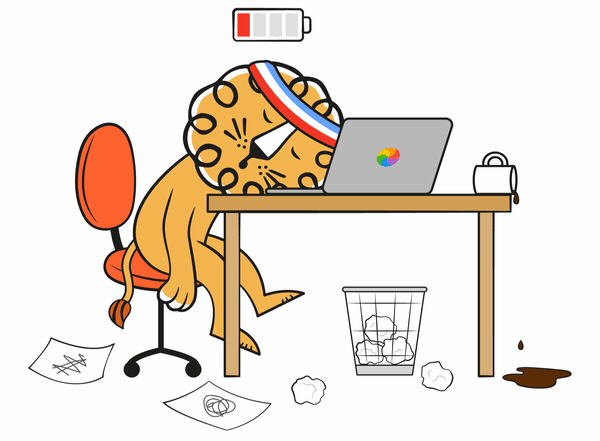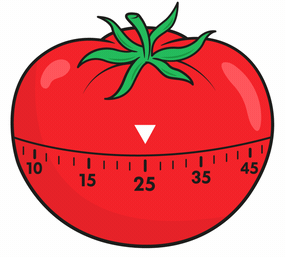Take a Break, Before You Brake!
When I start thinking about work-life balance, I think of a parable I read in a self-improvement book years ago. For those curious, I honestly can’t remember the name of it, my apologies.
Despite that, the story stuck with me.
I’ll summarise it here:
There was an annual lumberjack competition. After days of competing, there were only two remaining lumberjacks: One man well into his middle years and another 20 years his junior.
The final competition was simple: Whoever cut the most trees down within 8 hours wins.
The young lumberjack immediately began hacking away at trees, dropping five trees within minutes, while there was still silence from his opponent.
Eventually, he heard the older lumberjack working, but by then, he was already a dozen trees ahead. In his mind, he had already won. He was younger and had superior stamina and likely superior strength, so he decided to work through the day.
Periodically, he would hear his older competitor stop cutting. These periods of silence would redouble the young lumberjack's efforts. He was confident that he was pulling ahead in those moments when his competitor was resting.
Eventually, the day ended, and the young and old lumberjack went to the stage to hear who was the winner.
The young lumberjack, confident in his victory, walked to the stage with his axe lofted over his head only to hear the older lumberjack announced as the winner.
The young man yelled, "HOW COULD YOU POSSIBLY HAVE BEATEN ME?! I HEARD YOU STOPPING TO REST EVERY HOUR!"
The older lumberjack turned to him and said, "I wasn't stopping to rest. I was stopping to sharpen my axe... You little *."
The older lumberjack then proceeded to drop the microphone, backflip and moonwalk off the stage.
Okay, I may have exaggerated the original telling a bit, but the story was used as a parable to communicate the importance of rest.
Rest = Sharpening the Axe.
If you spend inordinate amounts of time working without rest, like I once did, then what you're doing is following in the footsteps of the young lumberjack. Sure, you'd be outputting a lot of effort, but your axe would be dull after you've gotten through a few trees.
The power of a blade isn't necessarily the force behind it, although that helps, but its sharpness. Being sharp effectively means the blade's cutting edge has a tiny surface area, so the energy imparted into it would generate incredible pressure.
(Pressure = Force/Area)
Your mind, body or whatever you use to work is your axe. OR, if you prefer fancy or fantastical references, your Katana, Excalibur or Durendal. Have your pick. Rest is vital to your productivity as focused work is since rest is where you sharpen your axe.
My Own Story of Overwork
Not too long ago, I was like the young lumberjack.
I'd spend countless hours in front of my screen working as a graphic designer in London. I'd work 12 or more hours in a row, sometimes stopping for lunch and eventually sleeping: Wake up, shower, have coffee, and get back to it.
I was spent pretty quickly, and I HATED design work.
Eventually, my enthusiasm for work died and in its stead came a horrific amount of stress and anxiety. My situation got so bad that I decided, quite radically, that the best solution was for me to join a monastery.
No, I'm not kidding.
I joined a contemplative monastery in Israel, where I would spend the next two years of my life. I would spend most of my days and nights in quiet contemplation of the holy scriptures. At first, it was fulfilling and a much-needed rest from the hustle and bustle of city life, but eventually, I got bored.
I moved to Spain, where my attempt to start a cheese farm quickly led me back to launching an animation studio. (Honestly, I'd instead not even get into it. Too many goats in those memories.)
As it turns out, I hadn't developed a hatred for animation. I was massively overworked. Since then, I've learned the importance of literally taking walks. Take moments away from the computer and work to reset the mind and soul.
How to Rest Properly and Avoid Overworking
Take the advice that follows with a grain of salt: everyone is individual, but some strategies and principles seem to be at least a little universal.
1. Set Strict Rules for Yourself
If you’re trying to solve a problem, it can become easy to overcommit yourself.
If you've been working for a while, you'll know what you operate like at your "best" and "worst". Instead of trying to "power through" your usual signs of fatigue, intentionally install breaks during your working periods.
You can use the "pomodoro" technique, which divides your working hours into 25-minute periods of productivity, followed by 5-minute breaks. You can run four cycles of these blocks before taking a lengthier 20-30 minute break.
Once you've run two of those cycles, take a slightly longer break, 45 mins to an hour and then return to work.
2. Set Clear Targets, Hit Them, Then do Nothing
Don't fall into the trap of "just one more" because there will always be "just one more".
Just one more paragraph. Just one more blog post. Just one more application.
I get that there's pressure to perform in today's job and freelance market, but if your aim is a fulfilling life, you must set firm boundaries to maintain balance. Start setting reasonable weekly or daily performance expectations but don't exceed your capacity to deliver very much.
By no means am I saying, "take it easy".
Work strategically and set appropriate workloads. Give yourself enough time to deliver high-quality work to your employer or clients, but also ensure that you have enough time to unwind or invest in other aspects of your life daily, weekly, or monthly.
Take our friend Joe Clarke for example. He wrote the copy on our homepage and has done incredible work for quite a few years.
He found himself stuck in the same cycle of overwork that we're talking about in this blog, so how did he change his life?
He takes a single week entirely off every month, without fail.
Now, as he clearly states. He's NOT doing this so he can "come back refreshed and raring to deliver the best of myself to my work." He takes his weeks off because he focuses on living a fulfilled life that gives time to things that interest him outside of work.
The happy byproduct of that, however, is sharpening his axe.
Your aim here isn't to literally "do nothing" (honestly, it just sounded better as a subheading) but to fill your free time with fulfilling and refreshing activities.
Joe's recently taken the idea of slowness to an entirely new level with his Snail studio. Check it out. He's a master of moving slowly.
3. Keep an Honest Score
Don't cheat yourself out of fulfilment. Seriously.
Work is important. We all need money to live and survive, so most of us work daily. But there is much more to life than just working. Keep an honest score of how well you're meeting your expectations.
Are you taking time off each day? Or are you making excuses to squeeze in "just a little more"?
So if you're interested in commissioning us to make an animation, please don't feel offended if we're too busy and can't take your project on. We appreciate the importance of resting and sharpening our axes. It makes us better at making animation and happier people.
If your project isn't too urgent, on the other hand, don't hesitate to get in touch with us by clicking on our snail-riding lion below.
Discover all 10 of our Simplification Commandments: 1) What's the 1st Step?, 2) Knowledge = Powah!, 3) Explain to Toddlers, 4) eXpEriMenT!, 5) Devil's Advocate, 6) Steal Sh*t!, 7) Take a Brake!, 8) Change Goals, 9) Give Up!, and 10) Ask for Help.
Our animation studio services for charities and healthcare organisations use these same principles to transform complexity into crystal-clear explainer videos.















